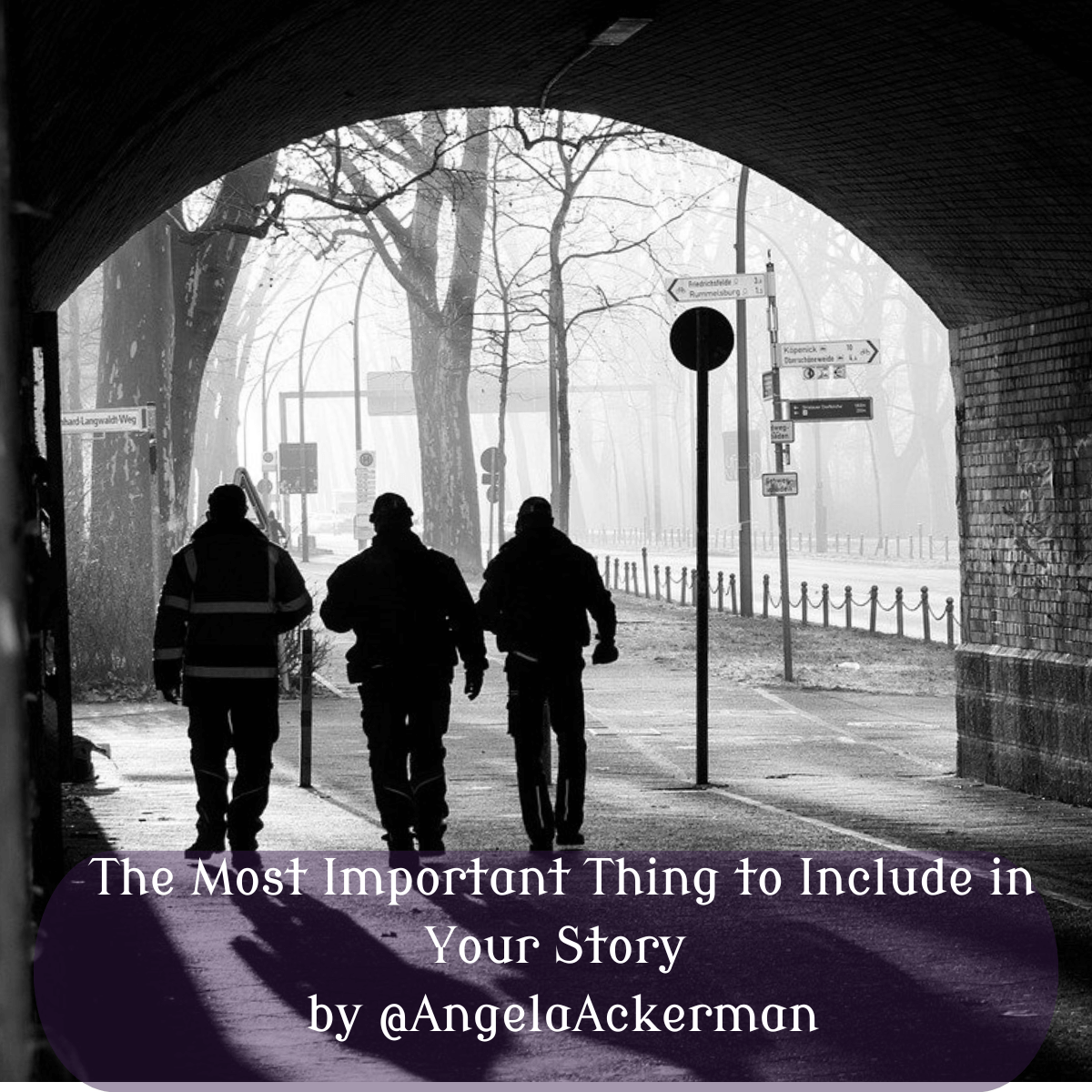by @AngelaAckerman @WriterThesaurus
Writing is no easy task, especially as it means juggling dozens of story elements at once: characters, plot, setting, dialogue, description, pacing, symbolism, you name it. And when we become so focused on bringing these things together, we may lose sight of our most important job: getting readers to bond with our characters.
Our fiction can have a larger-than-life cast, a crazy-twisty plot, and fantastical setting elements, but none of this will matter if we fail to get readers to care about and invest in our characters. Luckily, writers are subject matter experts in one area that consistently hooks readers no matter what form it comes in: common ground.
The Power of Common Ground
On the surface it might seem like a story’s job is to entertain, but it’s so much more than that. Throughout the ages, people have used story to communicate, share ideas, learn about the world, and understand themselves. People are psychologically wired for story, and so they come to our books looking for connection, insight, and experiences. Common ground can give them these things.
We have an ocean of things in common with readers. Here are three biggies to work into your story:
- PSYCHOLOGY
Psychology is the study of mental processes and behavior to understand why people think and behave as they do, so you can see why this one makes the cut. Certain psychological processes steer us, even though we may not realize it, shaping how we respond to life’s ups and downs, our behavior toward others and ourselves, the goals we seek, and more. Anything so fundamental to who we are should be present in our characters. Not only will this make them feel authentic and relatable, but it will give readers a sense of “sameness” as characters process, reason, and behave in familiar ways.
Let’s take a common psychological process: Cognitive Dissonance. This is the inner discomfort we feel when confronted with something that conflicts with a personal belief. For example, imagine you discover a terrible secret about a close friend: they’re siphoning money from their bookkeeping clients. Your friend begs you to not tell anyone and this causes a moral struggle between conflicting beliefs as you decide what to do: be a loyal friend or stop something that is hurting others.
This leads to another process: Emotional Reasoning, where you weigh and measure all the factors of this situation to help you decide what to do. For example:
How close is this friend? (Have they been there for you in ways others haven’t, or not?)
Who’s being hurt? (Are the innocent small business owners, or tax-dodging mega corps?)
What’s the money for? (Are they saving for a trip or paying off a child’s cancer medical bills?)
What can I live with? (Hard decisions mean looking in the mirror afterwards.)
Now, imagine this isn’t about you, but your character. If your story, readers may have never been in this exact situation, but they do know what it is like to be pressured into doing something they didn’t feel right about and will recognize that feeling of inner tension (dissonance). This common ground will trigger kinship and empathy, and bonus, readers will experience tension themselves as they wait to see what the character decides to do!
There are many mental processes we’re familiar with even though we may not know the psychological term for them. So, use what you know—show how your character reasons, the weight of their inner struggles, and the burden of difficult decisions or realizations. Readers will be drawn in through this psychological common ground.
2.EXPERIENCES
When readers are brought in close to a POV character, they get a chance to share their experiences. It might be tempting to only write situations that expose readers to new, exciting things, but to fast-track connection and empathy, we want to use common ground experiences they’ll relate to. For example:
- Making a mistake
- Failing at something
- The rush of being right when others doubted
- Enjoying it when someone gets what they deserve
- Reluctance over asking for help
- Breaking a promise
- Experiencing a moral dilemma
- Trying something new and being terrible at it
- Not giving up
- Being too quick to judge
- Making a choice even while suspecting it’s the wrong one
- Doing the right thing when it’s hard
- Making a sacrifice
- Giving in to temptation
- Having to let someone go
- Struggling with forgiveness
These are all common life experiences, meaning readers will relate to a character navigating it. And, as they read, that feeling of sameness bleeds through, perhaps due to the same emotions experienced, the way the situation was handled, or how this moment led to growth or change.
3. EMOTION
For readers to relate to and care about characters, we need emotion most of all. Emotion is part of our essence, giving each moment of our life meaning. We crave it, connect over it. So, when we expose our character’s raw emotions to readers, we open a private window into who they are, revealing their hopes, dreams, insecurities, and deepest needs.
Unfortunately, while emotions are powerful common ground, they come with a baked-in problem: characters like to hide what they feel. It’s not their fault, either – they’re just doing what we do in the real world. Emotion makes us feel vulnerable at times. So, if we feel unsafe to share, are worried about being judged or being viewed as weak, we hold our emotions in. Characters will do the same, and this can make it hard for readers to interpret what they are feeling.
A Backdoor to Your Character’s Emotions: Amplifiers
Characters who hide their feelings also control their responses, meaning readers won’t be able to pick up on their emotions through body language, vocal cues, expressions and actions. Not only that, but when characters self-regulate their emotions, they’re in control, meaning they rarely make missteps or mistakes. And let’s face it, in a story, we want them to screw up—it generates conflict, complications, and forces the character to make necessary changes to avoid painful mistakes down the road.
 It’s not in our best interest to let characters hide their feelings for long, so we need to do something to make them lose control. Believe it or not, another type of common ground can help us: emotion amplifiers.
It’s not in our best interest to let characters hide their feelings for long, so we need to do something to make them lose control. Believe it or not, another type of common ground can help us: emotion amplifiers.
Emotion Amplifiers are states and conditions like pain, attraction, scrutiny, and hunger which act as an additional burden the character must cope with on top of everything else. It erodes their ability to manage everything, and as the strain intensifies, they become emotionally volatile.
Take pain for example—we all know what that feels like. The stronger it gets, the harder it is to not become impatient, lash out at people around us, or act rashly.
Or what about competition? When a rival enters our space, we become sensitive, hyperaware, and it can disrupt our focus when we need it most.
Deploying an amplifier against our character not only brings their emotions into view, it hits on common ground in that readers will recognize and empathize with the strain it causes.
Emotion Amplifiers are versatile and can elevate your story in many ways. To find out more about them check out The Emotion Amplifier Thesaurus: A Writer’s Guide to Character Stress and Volatility.
What type of common ground do you include in your story? Let me know in the comments!

Angela Ackerman is a story coach, international speaker, and co-author of the bestselling book, The Emotion Thesaurus: A Writer’s Guide to Character Expression, and its many sequels. Available in nine languages, her guides are sourced by universities, recommended by agents and editors, and are used by novelists, screenwriters, and psychologists around the world. To date, this series has sold over 1.2 million copies. Angela is also the co-founder of the popular site Writers Helping Writers®, as well as One Stop for Writers®, a portal to game-changing tools and resources that enable writers to craft powerful fiction.2.
The Most Important Thing to Include in Your Story by @AngelaAckerman @WriterThesaurus: Share on X
Image by wal_172619 from Pixabay

Thanks so much for the post, Angela! You've made such an important point. Without emotion, it's tough to relate to characters, which can lead readers to stop reading.
Thanks for having me! Common ground is the best way to make readers feel something, and it comes in so many different forms, which is why I love it! :)
This is really interesting! I couldn't agree more that a book will resonate a lot more with readers if there's al ink to readers' own realities. And that means things like psychology. Thanks for this perspective.
Very glad you enjoyed this one, Margot!
Appreciate the list of amplifiers. Gives me ideas for even more things I could pile on a character.
Yes, absolutely. I think we're always looking for ways to increase the strain on our characters and amplifiers can personalize any situation in a way that the character's authentic emotions rise up, making the moment harder hitting. :)
Thanks for all the great tips, especially the ones on using common ground experiences and the emotional amplifiers.
Thanks for popping in Natalie! I am so glad this post was helpful to you :)
It is all about common ground and readers relating to your characters.
100%! We want readers to see a bit of themselves and their own life experiences in the story. That's what makes them feel more emotionally involved.
Great advice for writing believable characters.
So glad you liked this one – always good to be thinking about how we can create common ground. :)
Hi Elizabeth – I've always been impressed with Angela's thoughts and her various books to help us improve our stories. These look really interesting … and I'm certain will be of value to many – cheers to you both – Hilary
Thank you, Hilary – so very glad you enjoyed this post. Common ground is so important, and a wonderful way to make a reader feel like an insider & participant.
As Donald Maas said in one of his classes I took, If you believe you have enough emotion, you don't, You need more. Take it over the top then dial back .
I've been using this book and it helps a lot.
I have that book! It really helped me show, not tell, in my first book.
That’s great! I’m going to put the whole book on my TBR list. :)